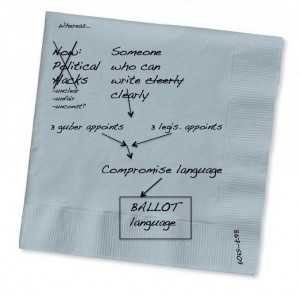Frankly, I don’t know what to make of the debate over the wording of Constitutional Amemdment summaries appearing on Minnesota ballots. Secretary of State Ritchie’s wording seems significantly more clear and descriptive of the actual amendment content. But I’m not sure if a Secretary of State has authority to change the language that the Legislature passes. Soon, the Minnesota Supremes will clarity that question.
But regardless of what the justices say about authority, I wonder if there is a better way to draft clear and accurate ballot language in the future?
 I have a rough idea that I recently developed over a few adult beverages. What, you think the Founding Dads didn’t scribble on the occasional ale house napkin?
I have a rough idea that I recently developed over a few adult beverages. What, you think the Founding Dads didn’t scribble on the occasional ale house napkin?
Anyway, here is my idea: The Legislature and Governor could pass a statute to create a “Ballot Initiative Commission,” or some such proper sounding name. The Commission’s job would be to develop the wording of ballot summaries, which means neither the Legislature nor the Secretary of State would have drafting authority in the future.
Sample Commission details: The Governor could appoint three members, and legislative leaders could appoint three members. None of the members could be current elected officials or government employees, or have served as an elected official or government employee for the past 10 years.
To help get the focus on clarity, the first draft of the ballot language would be developed by whoever is the current head of the University of Minnesota’s Department of English. The English Department Chair’s role would be advisory only.
The Commission could alter the draft however it collectively wanted. There would need to be a majority vote of the Commission supporting the final wording before the language would be conveyed to the Secretary of State for inclusion on the ballot. There would be deadlines to ensure they got their work done in a timely fashion.
The Commission’s wording obviously could still be challenged in the courts, as is happening now with the status quo system. But the big change would be that the language would originate from this less partisan Commission that is structurally required to compromise, not elected officials in either the Legislature or the Secretary of State’s office, or their staffs.
I don’t feel especially strongly about the details of the proposal. The pointy-heads at the Capitol can add all the “whereases,” “in lieu ofs” and “heretofores” they want. The underlying principles are what matter:
REDUCE THE POLITICIZATION OF THE DRAFTING PROCESS. Get ballot language drafting out of the hands of elected officials, who will always be tempted to be more concerned about partisan advantage than clarity or accuracy. Instead, get the drafting into the hands of less partisan Minnesotans.
BAKE THE NEED FOR BIPARTISAN COMPROMISE INTO THE PROCESS. Numerically speaking, structure the Commission so that the Legislature’s appointees can’t attain a majority without winning over at least one vote from a gubernatorial appointee, or vice versa.
PUT MORE INITIAL FOCUS ON CLARITY. At least begin the process with a writer who is paid to be clear, not a writer who is paid to win elections.
A perfect process? Of course, not. Games would still be played. But it would be much better than the current process that is currently in the throes of a messy food fight in the State Supreme Court.
Anyway, if anyone out there is interested, I think I still have the napkin.
– Loveland
This post was also featured as a “best of the best” on MinnPost’s Blog Cabin feature.

I know this isn’t the same thing you’re talking about, but I thought you might be interested in reading about Healthy Democracy Oregon. http://healthydemocracyoregon.org/about
It’s connected, loosely, to a client of ours (Jefferson Center/Jefferson Action), which is how I came to know of it. Its purpose is to objectively (as much as possible) evaluate ballot initiatives so voters can make better-informed voting decisions.
Here’s my favorite part: “During the 2011 Legislative Session, the Oregon Legislature passed House Bill 2634 which made the Citizens’ Initiative Review a permanent part of Oregon elections.” So it’s the real deal. Pretty cool.